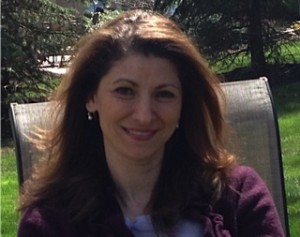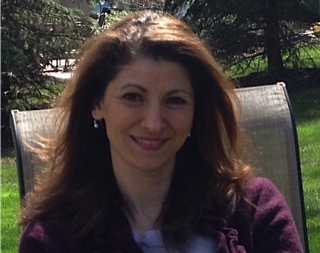Heidi Moawad, MD is a neurologist, professor and author of “Careers Beyond Clinical Medicine.” In this interview, she tells us about what led her down this path and about her research.
Sasha Yakhkind: Tell us about your path to medicine.
Heidi Moawad, MD: I was always interested in science, so when I was in high school, I applied for the Pre-Professional Scholars Program in Medicine at Case Western Reserve University in Cleveland, Ohio. The program accepted undergraduate students with a guarantee into the medical school. I thought the first two years of medical school were so challenging. All I remember was studying all the time! [Then the] clinical training was so exciting! It was amazing to see all of the book facts actually turn into ‘real experiences.’
SY: How would you recommend students make the most of their training?
HM: I think that students should absolutely never hesitate to ask questions. Students can be so preoccupied with making a good impression that they often hesitate to ask questions for fear of appearing stupid. The more you ask and learn at the early stage, the more you will know later. Remember that you will be a doctor for a very long time — use your time as a student to learn as much as you can. It is very unusual for an attending on the wards to have a negative impression of a student.
SY: How did you get to where you are now?
HM: I was so curious about the world behind patient care. I always wondered — who sets all of these rules and restrictions? That led me to a job in utilization review. I really enjoyed getting ‘behind the scenes’ of medicine and I learned so much about the health care industry. It is very complex and it is becoming more and more regimented. It is really beneficial for a doctor to learn about other aspects of medical care.
SY: What is your experience working outside of clinical medicine?
HM: I worked for a consulting company. Insurance companies used the company that I worked for to do utilization review, which includes deciding which diagnostic tests are covered and doing appeals. I specifically helped in setting guidelines for neuroimaging. Brain MRIs, brain CTs, PET scanning. And I was the medical appeals person for denied tests that physician’s offices wanted reconsidered. I got into it while I was arguing with the company when they were denying my order for a brain MRI on one of my patients. At the time, the job didn’t formally require clinical experience, but they would not have taken someone who had not already had patient care experience. I know that now these types of jobs officially require clinical experience, and they are very regulated.
SY: What did you learn from this experience?
HM: I learned a lot, actually. All of the tests I denied were unnecessary — for example, they were tests requested for patients who already had the same test a few weeks ago for the same problem, but forgot to tell their doctors. Neurology patients often have cognitive disability, so they can’t remember. Or the doctors weren’t familiar with neurological problems so they ordered everything they could think of, hoping that I would decide for them which tests were necessary. It was a way to avoid being blamed for not ordering something. Also, patients often requested tests like PET scans because they read about them on the internet and wanted to make sure they didn’t have a disease, even if they didn’t have symptoms. The insurance companies would pay for tests that are indicated, but if a patient wanted a test out of curiosity, they could get it, but insurance wouldn’t pay.
SY: Could you tell us a little about your book and your research?
HM: I wanted to make information about non-clinical careers readily available to doctors. I had so many doctors asking me to help them find a non-clinical position. I had to work very hard to find some of the non-clinical positions that I have worked in. So my book provides a lot of detailed information and instructions for doctors, so that they don’t have to do the exhaustive research that I had to do to get a non-clinical position.
SY: What is the most important thing you learned in the process of writing your book?
HM: I learned that doctors are very generous about sharing information and advice so that other physicians can succeed. Out of about 50 physicians that I interviewed, literally only one did not want me to share ‘trade secrets’ with others for fear that they would get advice for ‘free.’ Overall, my research was enjoyable and it was so nice to hear from other doctors who genuinely wanted to help physicians attain career satisfaction.
SY: What is the most fulfilling part of your job now?
HM: I really love teaching and writing and telemedicine. I personally love seeing patients, but I didn’t want to be trapped in a full time schedule that wouldn’t allow me to explore other aspects of medicine. That is why telemedicine works for me. The teaching is great because I always get to see how students think and how they are capable of so much more than they thought they were capable of. And the writing is fun and relaxing — it doesn’t feel like work because it is so enjoyable.
SY: What advice would you have for medical students on choosing work outside of clinical medicine?
HM: I think that the first step is to become knowledgeable. Know what you are talking about before you approach anyone about a job. Many recruiters have told me that doctors tell them, “I am willing to do any non-clinical job you have.” And that, unfortunately, automatically excludes a physician from actually getting a job. Know the available opportunities and the best way to approach each type of non-patient care job.
SY: Where can we find more information?
HM: My website Non Clinical Doctors provides advice and direction. My book “Careers Beyond Clinical Medicine” provides a lot of information — I really didn’t want to leave anything out. I think any doctor can get a job in the non-clinical world.
 Dr. Heidi Moawad, MD is the author of “Careers Beyond Clinical Medicine.” She is a neurologist practicing telemedicine, an adjunct professor at John Carroll University, and on the editorial board of Neurology Clinical Practice, as well as the stroke expert for About.com.
Dr. Heidi Moawad, MD is the author of “Careers Beyond Clinical Medicine.” She is a neurologist practicing telemedicine, an adjunct professor at John Carroll University, and on the editorial board of Neurology Clinical Practice, as well as the stroke expert for About.com.




